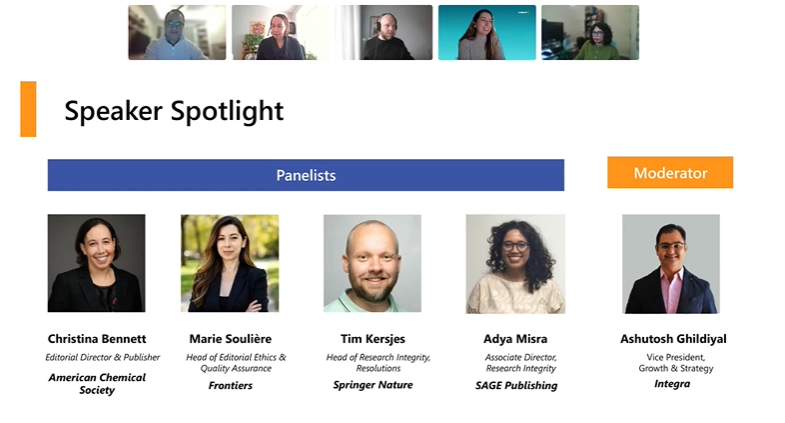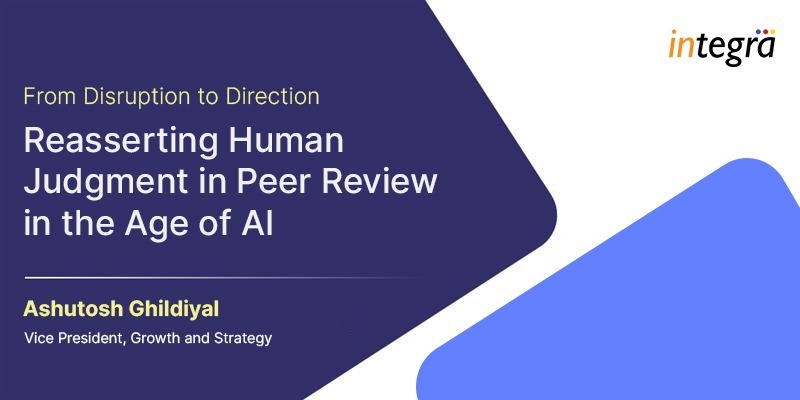Research Integrity in Action: Key Insights from Our Panel Discussion

On November 24, Integra hosted a thought-provoking webinar that brought together four leading voices in research integrity to examine the most pressing challenges facing scholarly publishing today. Research Integrity in Action: Lessons, Challenges, and Solutions from the Frontline featured:
- Christina Bennett, PhD – Editorial Director & Publisher, American Chemical Society
- Dr Marie F Soulière – Head of Editorial Ethics and Quality Assurance, Frontiers
- Tim Kersjes – Head of Research Integrity Resolutions, Springer Nature
- Dr Adya Misra – Associate Director, Research Integrity, SAGE Publishing
The session was moderated by Ashutosh Ghildiyal, Vice President – Growth & Strategy, Integra, who guided the conversation through real-world challenges and emerging opportunities at the intersection of AI, peer review, and research integrity.
▶ Watch the full webinar recording here
The discussion revealed a field at a critical inflection point—confronting increasingly sophisticated threats while redefining how the scholarly community understands, accepts, and normalises corrections to the scientific record.
The Landscape: Systemic Threats Require Systemic Responses
Research integrity challenges have evolved from isolated anomalies into systemic risks that actively exploit editorial and peer review workflows. The panel highlighted several converging pressures:
- Paper mills producing fabricated manuscripts at scale
- Peer-review manipulation through coordinated rings
- AI-generated and AI-manipulated content that is increasingly difficult to detect
- Image manipulation and data fabrication
- Duplicate submissions across multiple publishers
These threats directly undermine trust in science, with cascading consequences for policy, clinical practice, and future research built on compromised foundations.
Reframing the Conversation: Correction, Not Punishment
Tim Kersjes emphasised that retractions should function as neutral corrective mechanisms—not punitive measures. Whether an issue arises from honest error or deliberate manipulation, the objective remains the same: safeguarding the integrity of the scientific record.
This reframing challenges the stigma traditionally attached to retractions.
When handled transparently and responsibly, retractions are evidence of science working — not science failing.
Dr Adya Misra shared SAGE’s experience with mass retractions, positioning these actions as demonstrations of accountability and institutional maturity. SAGE’s early detection of large-scale peer review manipulation helped set critical precedents for the industry.
Christina Bennett highlighted the complementary — yet sometimes divergent — roles of institutions and journals. While institutions often focus on accountability, journals prioritise correcting the literature. Strengthening collaboration between these stakeholders is essential for coherent, effective outcomes.
The AI Paradox: Tool and Challenge
Dr Marie F Soulière provided nuanced insight into AI’s dual role in integrity workflows. While AI-enhanced screening strengthens early detection, it also shifts complexity further downstream, requiring increased human expertise and judgment.
Bad actors increasingly use AI to produce sophisticated fraudulent content, including paraphrased text with “tortured phrases” and subtly manipulated images. At the same time, reviewers are beginning to incorporate AI into report drafting.
The critical question is no longer whether AI should be used, but how it can be integrated responsibly without compromising independent thinking and rigor.
Collaboration as Infrastructure
A unifying theme across the panel was that research integrity cannot be addressed in isolation:
- Cross-publisher coordination strengthens pattern recognition and intelligence-sharing.
- Publisher–institution partnerships align accountability with corrective action.
- Professional networks support integrity specialists navigating complex, high-stakes work.
Sustainable progress depends on collective action, not siloed initiatives.
Practical Realities and Trade-offs
The panel openly addressed operational challenges, including accountability in AI-assisted workflows, balancing speed with thoroughness, and clarifying where scrutiny should sit within increasingly complex processes.
Dr Adya Misra highlighted how SAGE’s extensive decontamination efforts required sustained organisational commitment and deep cross-functional coordination.
Dr Marie Soulière reinforced the importance of clear role delineation between editors and reviewers to ensure consistency and accountability without fragmentation.
Looking to 2030: Vigilance and Cultural Change
Looking ahead, several defining themes emerged:
- Threats will continue to evolve, demanding adaptive and proactive responses.
- Increased retractions may signify stronger vigilance rather than lowered standards.
- Cultural shifts toward transparency will be as critical as technological advancement.
- Editorial teams will require hybrid skillsets combining human judgment with intelligent automation.
Audience Perspectives
Live audience polls revealed:
- Limited time and resources remain major operational barriers
- Stronger publisher–institution collaboration is widely desired
- Persistent stigma around retractions requires active cultural change
- Openness, shared standards, and advanced AI tools are seen as key to future progress
Moving Forward
The session reinforced that research integrity is not solely about detection. It demands:
- A constructive culture around corrections
- Deep collaboration across the ecosystem
- Continual adaptation to emerging risks
Above all, retractions and corrections must be understood as vital signals of a functioning, self-correcting scholarly system — not as reputational failures.
The Path Forward: Vigilance, Collaboration, and Cultural Transformation
The discussion underscored a three-pillar approach necessary for sustainable impact:
Vigilance
Continuous monitoring, adaptive responses, and evolving detection frameworks are essential as the sophistication of threats increases.
Collaboration
No single organisation can address these challenges alone. Collective intelligence across publishers, institutions, and professional networks creates resilience.
Cultural Transformation
Technical solutions will falter without mindset change. Progress requires:
- Normalising retractions as part of scientific self-correction
- Communicating more clearly what different corrections signify
- Valuing transparency over perfection
- Encouraging accountability without fear
- Strengthening reviewer responsibility as integrity partners
- Advancing public understanding of how science evolves and corrects itself
If retractions increase, is that failure — or proof of better oversight?
The answer lies in context, not just numbers.
About the Panel
Christina Bennett, PhD
Editorial Director & Publisher, American Chemical Society
Christina supports the strategic and editorial management of ACS’s ~90 journals. Previously, she served as Publications Director of Policy at the American Physiological Society.
Dr Marie F Soulière
Head of Editorial Ethics and Quality Assurance, Frontiers
Marie leads Frontiers’ ethical oversight and quality assurance operations, bringing deep experience across biomedical, physical sciences, and humanities publishing.
Tim Kersjes
Head of Research Integrity Resolutions, Springer Nature
With a background in philosophy and NGO leadership, Tim brings a structured investigative lens to managing complex integrity cases.
Dr Adya Misra
Associate Director, Research Integrity, SAGE Publishing
Adya leads SAGE’s global research integrity initiatives across 1300+ journals and was awarded the 2024 People of Publishing Award for her contributions to the field.
Moderator
Ashutosh Ghildiyal
Vice President – Growth & Strategy, Integra
Ashutosh steered the discussion through the evolving realities of AI, peer review, and research integrity with clarity and practical industry insight.
Concluding Thoughts
Research integrity operates within a space of constant tension — between speed and caution, transparency and protection, accountability and trust. Yet the session offered strong grounds for optimism: a community thinking critically, acting transparently, and aligning around shared values.
The challenges are significant. But so too is the collective commitment to protecting the scientific record and strengthening the mechanisms that ensure its credibility.
Thank You
Thank you to everyone who joined us for this important conversation.
▶ Watch the full webinar recording here:
At Integra, we remain committed to supporting publishers and scholarly societies with end-to-end workflows that embed integrity at every stage — from submission screening and research integrity checks through peer review management, copyediting, and production.
For more information about our research integrity services, please contact us.
We look forward to continuing this dialogue and hosting more conversations on the evolving challenges shaping scholarly publishing.
Recent Blogs

Print, Pedagogy, and AI: The New Architecture of Educational Publishing

From Disruption to Direction: Reasserting Human Judgment in Peer Review in the Age of AI


